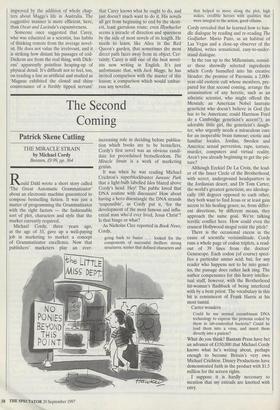The Second Coming
Patrick Skene Catling
THE MIRACLE STRAIN by Michael Cordy Bantam, £9.99, pp. 364 Roald Dahl wrote a short story called `The Great Automatic Grammatizator' about an electronic machine guaranteed to compose bestselling fiction. It was just a matter of programming the Grammatizator with the right factors — the fashionable sort of plot, characters and style that the market currently required.
Michael Cordy, three years ago, at the age of 33, gave up a well-paying job in marketing to market a concept of Grammatizator excellence. Now that publishers' marketers play an ever- increasing role in deciding before publica- tion which books are to be bestsellers, Cordy's first novel was an obvious candi- date for preordained bestsellerdom. The Miracle Strain is a work of marketing genius.
It was when he was reading Michael Crichton's superblockbuster Jurassic Park that a light-bulb labelled Idea blazed above Cordy's head. Hey! The public loved that DNA routine with dinosaurs! How about having a hero disentangle the DNA strands `responsible', as Cordy put it, 'for the development of the most famous and influ- ential man who'd ever lived, Jesus Christ'? Is that bingo or what?
As Nicholas Clee reported in Book News, Cordy, going back to basics . . . looked for the components of successful thrillers: strong structures, scenes that defined characters and
that helped to move along the plot, high stakes, credible heroes with qualities that were integral to the action, good villains.
Cordy revealed that he learned how to han- dle dialogue by reading and re-reading The Godfather. Mario Puzo, as an habitué of Las Vegas and a close-up observer of the Mafiosi, writes sensational, easy-to-under- stand dialogue.
In the run up to the Millennium, consid- er these shrewdly selected ingredients which Cordy funnelled into his creative blender: the promise of Parousia; a 2,000- year-old esoteric cult whose members, pre- pared for that second coming, arrange the assassination of any heretic, such as an atheistic scientist, who might offend the Messiah; an American Nobel laureate geneticist who doesn't believe in God (he has to be American; could Harrison Ford do a Cambridge geneticist's accent?); an adorable little girl, the geneticist's daugh- ter, who urgently needs a miraculous cure for an inoperable brain tumour; exotic and familiar locales, Jordan, Sweden and America; sexual perversion, rape, torture, murder, computers and virtual reality. Aren't you already beginning to get the pic- ture?
Although Ezekiel De La Croix, the lead- er of the Inner Circle of the Brotherhood, with secret, underground headquarters in the Jordanian desert, and Dr Tom Carter, the world's greatest geneticist, are ideologi- cally 180 degrees opposed to each other, they both want to find Jesus or at least gain access to his healing genes; so, from differ- ent directions, by different means, they approach the same goal. We're talking terrific conflict here. How could even the crassest Hollywood mogul resist the pitch?
There is the occasional excess in the cause of scientific verisimilitude. Cordy runs a whole page of codon triplets, a read- out of 39 lines from the doctors' Genescope. Each codon (of course) speci- fies a particular amino acid; but, for any reader who happens not to be into genet- ics, the passage does rather lack zing. The author compensates for this heavy intellec- tual stuff, however, with the Brotherhood hit-woman's flashback of being interfered with by a bent priest. The vocabulary in this bit is reminiscent of Frank Harris at his most tumid.
Carter wonders
Could he use normal recombinant DNA technology to express the proteins coded by them in lab-controlled bacteria? Could he load them into a virus, and insert them directly into a patient?
What do you think? Bantam Press have bet an advance of £150,000 that Michael Cordy knows what he's writing about, perhaps enough to become Britain's very own Michael Crichton. Disney Productions have demonstrated faith in the product with $1.5 million for the screen rights.
I suppose it is hardly necessary to mention that my entrails are knotted with envy.


































































 Previous page
Previous page